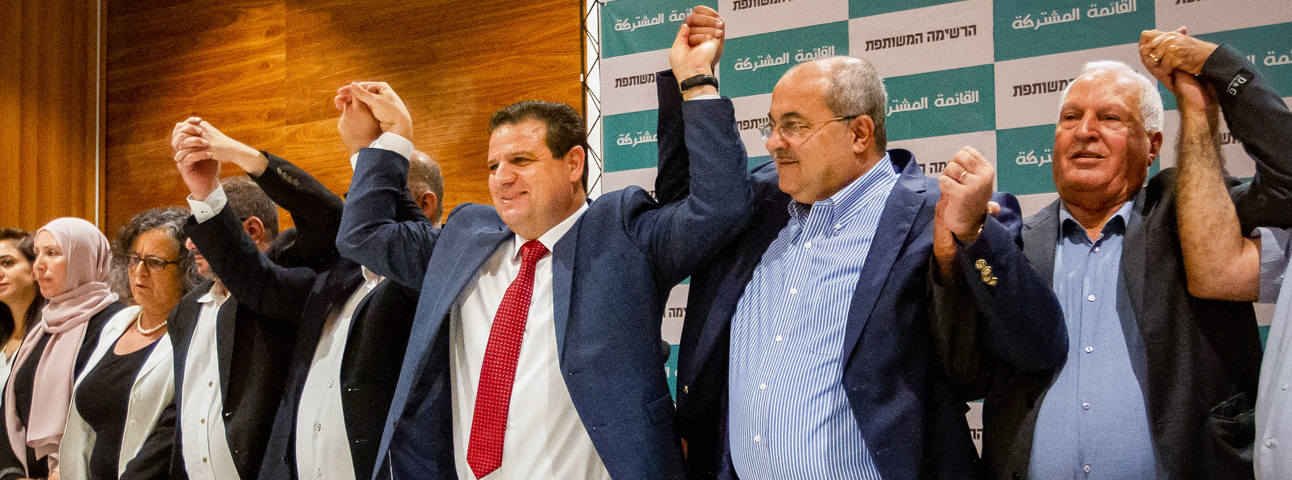Every Cloud has a Silver Lining?
Arab parties can surge if they shake off the old politics - a significant number of Arabs who stayed home in April will vote if they are persuaded their leaders have integrity.

Flash 90
With Thursday’s impending deadline for submitting candidate lists to the Central Elections Committee, the Joint List, which has finally managed to reunite, must deal with a paradox that is far from simple. The prevalent view in the Arab sector is that the List has the potential to win 15 Knesset seats. But this potential can be realized only if the Arab turnout at the polls is much higher than the 49.2% recorded in the April elections, and that it does not lag too far behind the figure for the electorate as a whole.
The good news is that polls conducted even before all four parties came aboard, predicted that the Joint List would win 11 seats in the new Knesset. This figure reflects the Arab sector’s significant electoral potential and suggests that the low turnout in the spring was not a principled boycott of the electoral process, but rather a message to the Arab parties to rethink their course of action. The developments of recent days indicate that the parties got the message.
The not-so-good news is that the Joint List will now have to cope with an unfavorable situation. In total contrast to the euphoria surrounding the birth of the Joint List in January 2015, in advance of the elections for the 20th Knesset, this time the success of the political maneuvering to put the political pieces together was greeted only with a sigh of relief. The four Arab parties making up the United List — Hadash, Balad, Ra’am, and Ta’al — will have to overcome the negative residues left by the internal crises that wracked the List over the last two years and finally led to its dissolution only six months ago. The parties will also have to deal with the disgust that many Arab citizens feel for the old “politics as usual.” This feeling, which reached a peak in the last elections, is reflected in the criticism repeatedly directed against the four parties after the results were in: you represent only a third of the Arab electorate (including those who did not cast a ballot).
The Joint List will also have to cope with the appearance of new players in Arab politics, including the “Popular Unity” party set up at the initiative of Prof. As’ad Ghanem, a political scientist at the University of Haifa. This party aspires to embody the “new politics” on the Arab street. It seeks to give a voice to political players that are not necessarily identified with the four veteran parties that form the Joint List, and to thus become an authentic political alternative.
Perhaps it is precisely as a result of the competition between the “old politics” and the “new politics” that the Knesset will again be a relevant arena for the struggle of Arabs, who will believe that they have the power to influence the situation by going out to vote. The Arabs are not indifferent to politics. They only want to be sure that the politicians they support at the ballot box are worthy of their vote. A poll conducted by the Israel Democracy Institute on the eve of the last elections, found that Arab voters see integrity (32.9%), the ability to get things done (23.9%), and keeping one’s promises to the voters (14.2%) as the most important traits of a political leader.
Now that the Joint List has been re-established, the members of the four parties can roll up their sleeves and get down to the fundamental task that faces them: increasing voter turnout in the Arab sector. According to a survey conducted by the Abraham Initiatives, Sikkuy, and the Accord Center before the agreement to restore the Joint List was announced, only 42% of the Arab public was planning to vote in September. The more important finding, however, is that no fewer than 25% of Arab voters who were on the fence about going out to vote reported that the return of the Joint List might have a positive impact on them and encourage them to go to the polls on Election Day.
The ball is in the Arab parties’ court. Their mission — to regain the public’s trust and encourage participation in the elections — will not be easy; but it is certainly feasible.
The article was published in the Times of Israel.
